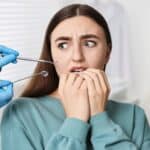After your tooth extraction, there might be some discomforts you can feel such as numbness and slight pain around the extraction site. Once the procedure is done, your dentist will provide you some aftercare tips you must follow.
The most important thing is you need to stay relax for the rest of the day, take some easy exercises if you want and avoid the things that hinder your mouth’s fast recovery.
Tooth Extraction Aftercare Instructions
Here are things you should do to help your mouth heal faster following the extraction procedure.
Rinsing your Mouth
- Do not rinse the area for about 24 hours after the treatment. The socket needs to recover so you should avoid damaging the blood clot. You can do this by avoiding chewing on the certain side or allowing the tongue to distract the area. Disturbing the socket only allows the infection and affects the recovery.
Brushing the Teeth
- Cleaning your mouth is always necessary, especially after extraction. On the other hand, you should be careful cleaning your teeth around the recovering area.
Bleeding
- During the first day or so, there will be some minor bleeding happening. You may be concerned about the amount of bleeding. Sometimes it seems dramatic due to the blood that’s combined with a larger volume of your saliva.
- When there is bleeding, refrain from rinsing out. Just apply pressure to the affected area. Use a clean piece of cotton to bite firmly on the socket for around 15 minutes. Make sure it is in place over the extraction site. Replace the pad if needed. If the bleeding continues to happen for more than an hour, call your dentist for some assistance.
Diet
- While the anaesthesia is not yet wearing off, don’t try to consume hot foods and beverages.
- For the first 1-week of your recovery after the procedure, you need to avoid crunchy and spicy foods. Here are the dishes you must eat instead: oatmeal, mashed potato, smoothies and shakes, ice cream and soup. Any meals that are soft and not chewy are great for your diet while recovering from tooth extraction.
When to Seek Help from your Dentist
Bleeding, pain and some swelling are typical effects of tooth extraction. Nevertheless, if these effects become severe especially if the bleeding continues for several hours after the treatment, you must contact your dentist. Seeking help from your dentist includes the following scenario.
- Indications of infection as well as fever and chills
- Vomiting or nausea
- Inflammation or excessive discharge from the affected extraction area
- Cough, chest pain or shortness of breath
For around 2 weeks, the area will start to heal. The new bone and gum tissue will begin to grow into the gap. Over time, this vacant space causes the remaining teeth to shift, which can affect your bite and chewing activities. For that reason, the dentist may recommend patients to get dental implants, dentures or bridges to replace the missing teeth.
Quality Tooth Extraction in Brisbane
To get excellent tooth extraction treatment, visit your reliable Brisbane dentist today. With our outstanding dental expertise, we guarantee a safe and more comfortable way of performing different forms of dental extractions. To restore your teeth and healthy smiles, we also offer comprehensive and first-rate restorative solutions. Through our high-quality dental procedures, you can achieve admirable oral health wellness for life.







